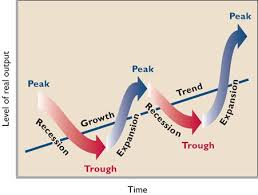Inflation
In economics, inflation refers to a general progressive increase in prices of goods and services in an economy. When the general price level rises, each unit of currency buys fewer goods and services; consequently, inflation corresponds to a reduction in the purchasing power of money. The opposite of inflation is deflation, a sustained decrease in the general price level of goods and services. The common measure of inflation is the inflation rate, the annualised percentage change in a general price index.
Prices will not all increase at the same rates. Attaching a representative value to a set of prices is an instance of the index number problem. The consumer price index is often used for this purpose; the employment cost index is used for wages in the United States. Differential movement between consumer prices and wages constitutes a change in the standard of living.
Definition
The term inflation appeared in America in the mid-nineteenth century, “not in reference to something that happens to prices, but as something that happens to a paper currency”. Today, however, it is understood as referring to a sustained increase in the general price level (as distinct from short-term fluctuations).
The expression “price inflation” may either be synonymous with “inflation” or reflect some more restrictive definition of “price”. Changes to the wage level are described as “wage inflation” and changes to the money supply as “monetary inflation”. These terms are sometimes assumed to identify the causative factor.
Effects of inflation
General effect
Inflation is the decrease in the purchasing power of a currency. That is, when the general level of prices rise, each monetary unit can buy fewer goods and services in aggregate. The impact of inflation differs on different sectors of the economy, with some sectors being adversely impacted while others benefitting. For example, with inflation, those segments in society which own physical assets, such as property, stock etc., benefit from the price/value of their holdings going up, when those who seek to acquire them will need to pay more for them. Their ability to do so will depend on the degree to which their income is fixed. For example, increases in payments to workers and pensioners often lag behind inflation, and for some people income is fixed. Also, individuals or institutions with cash assets will experience a decline in the purchasing power of the cash. Increases in the price level (inflation) erode the real value of money (the functional currency) and other items with an underlying monetary nature.
Negative
High or unpredictable inflation rates are regarded as harmful to an overall economy. They add inefficiencies in the market, and make it difficult for companies to budget or plan long-term. Inflation can act as a drag on productivity as companies are forced to shift resources away from products and services to focus on profit and losses from currency inflation. Uncertainty about the future purchasing power of money discourages investment and saving. Inflation can also impose hidden tax increases. For instance, inflated earnings push taxpayers into higher income tax rates unless the tax brackets are indexed to inflation.
Positive
- Nominal wages are slow to adjust downwards. This can lead to prolonged disequilibrium and high unemployment in the labor market. Since inflation allows real wages to fall even if nominal wages are kept constant, moderate inflation enables labor markets to reach equilibrium faster.
- The primary tools for controlling the money supply are the ability to set the discount rate, the rate at which banks can borrow from the central bank, and open market operations, which are the central bank's interventions into the bonds market with the aim of affecting the nominal interest rate. If an economy finds itself in a recession with already low, or even zero, nominal interest rates, then the bank cannot cut these rates further (since negative nominal interest rates are impossible) to stimulate the economy – this situation is known as a liquidity trap.



Comments
Post a Comment